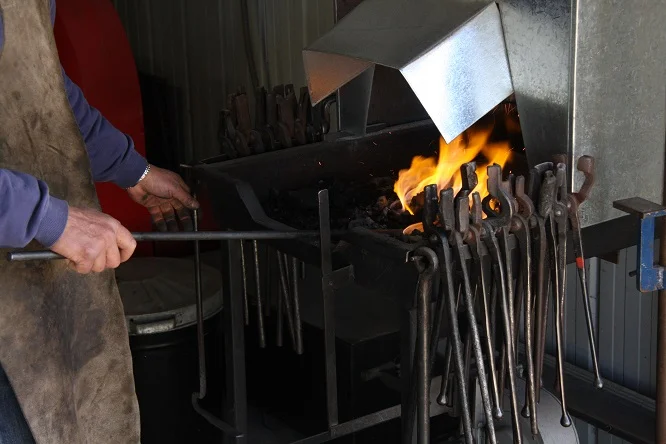The King of Trades
“There is something intrinsically satisfying in making things”
There’s an old legend of an English King called on to settle an argument between his master craftsmen as to which was the most important. Each in turn, the craftsmen put their case to the King.
“But where do you get your tools?” asks the King.
“The blacksmith,” each forced to admit.
And so the King declares the blacksmith the ‘King of Craftsmen’ as he is the only one who did not have to acquire his tools from another.
“It is the King of Trades,” Rob Swords tells me in his Kilmarnock Forge workshop out at Boree. “That was something I read a long time ago, but it's one of those things… exactly where the train of thought started, I don't know.”
Growing up on a farm, Rob had always tinkered a bit, but something about working with metal kept pulling at him.
He was actually working as a teacher for TAFE in the Primary industries and Natural Resources faculty, when he finally decided to pursue his dream.
“It was something I had thought about for a long time, so I didn't become a blacksmith straight out of school, I was a teacher, but it was one of those things,” said Rob.
“So I thought, I don't just want to do a weekend thing, I want to do the trade course so that's what I did; I did trades blacksmithing at Ultimo TAFE. I was fortunate that I was able to — for those three years — take leave and had enough to do it.”
Then Rob just started making things and selling them, more as a hobby than anything else. But soon an opportunity arose to run weekend classes in blacksmithing through TAFE.
“I ran the classes at the TAFE for about seven or eight years and after a while I thought it might be time just to do this myself and so that is what I've done. I 've been doing it for about 4 years here,” he said.
Rob estimated he has now taught blacksmithing fundamentals to several hundred people and he enjoys seeing people leave his workshop with the knowledge to pursue the art for themselves.
“They have varied reasons for doing it: some people are artists in another medium and I get guys off farms who want to know how to repair things, but it is not only a male thing —maybe 30 per cent of my classes are ladies,” said Rob.
“Some people do the class because they want a little hobby and maybe make things to sell. Some people do classes and they never intend to do any blacksmithing again, they just do it as something to do on a weekend, but they still had fun and they still make stuff.”
Rob’s own handiwork is highly varied: displayed around his workshop, you’ll find chisels, crowbars, fireplace tools, replacement camp oven handles, camping billy stands, knives, ornamental pieces and more.
“Do I know in advance what I'll be making next week? Often no,” said Rob.
“People approach me about an eclectic range of things; a couple of years ago a chap in Bathurst was restoring a 1920s Douglas Motorbike and I made him a clutch lever and a valve lifter. A local woodturner had gone online and seen a Russian woodturner making some bowls with a wood turning tool he hadn't seen before, so he came to and said can you make it? Sure. Who knows what I've got to make next?”
As well as selling what he makes himself, Rob is also a distributor European knives and axes.
“We've had a website since 2006. I try to keep quality stuff, so pocketknives out of Italy and axes out of Sweden and Austria and places like that… That's what keeps the wolves at bay!” he said.
There are a lot of people out there who go to work, day after day and year after year, doing something they really don’t enjoy, said Rob, who doesn’t appear to be in any danger of that.
“There is something intrinsically satisfying in making things; I think it is the same with anybody who makes anything,” said Rob
“If you spoke with a woodturner or cabinet maker or anybody who actually physically makes things; you can actually see what you've done.
“There aren’t very many people who get to do this for a living, most people do it part time, but I think it is just satisfying to be able to make stuff, to say ‘I made that’.”




